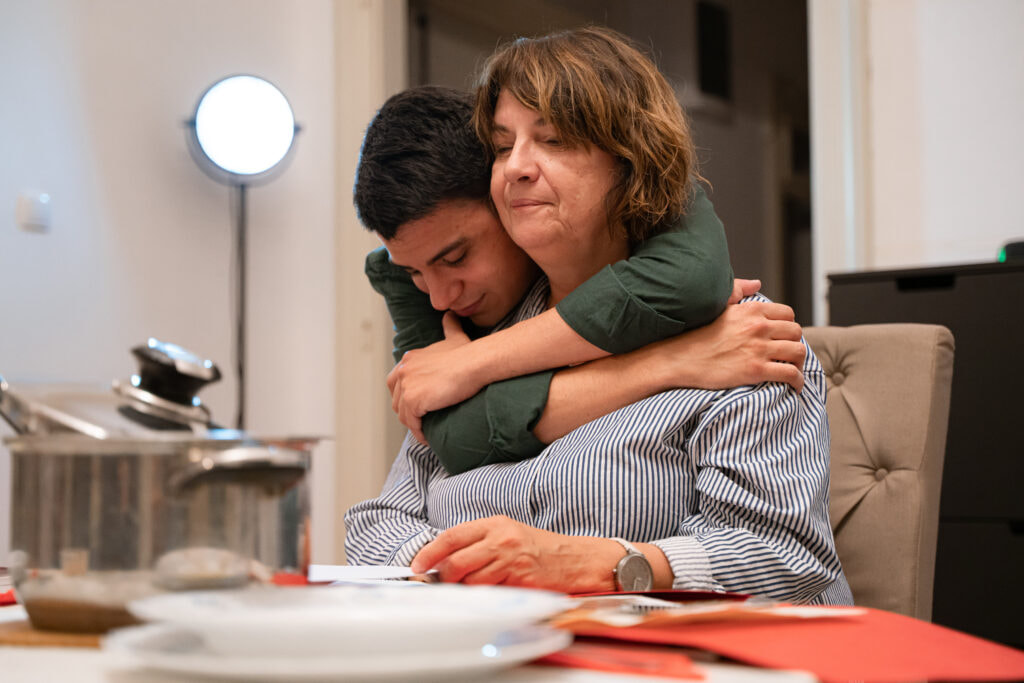Review by Adrian ZallaProduced by Heartefact, performed at the National Museum, Prishtina, as part of the Kosovo Theatre Showcase
Seeking love and acceptance, not a cure Is a hug a sign of acceptance? Of love and of being proud of the person whom you are hugging and not letting go? A living room is presented to us with a table surrounded by three chairs. A woman is preparing the table for dinner. A man insists he will also stay for dinner, in order to wait for his son who is coming from abroad. As he waits, he complains that his children do not respond to his texts. The mother and father discuss between themselves - mostly blaming each other - their son who has a “problem.” After they are done with blaming each other, they try to come up with a solution to cure the 'sickness' of the fact their son has "a close intimate roommate”. They find a solution in the book of Richard Cohen a 'former homosexual,' who got married and had three children and now writes about this, but you might rightly wonder if you are a 'former' something, do you still preserve the skill of being capable of that thing, or it is only when you excel at it? Cohen's book is called: “Coming Out Straight: Understanding and Healing Homosexuality” as if homosexuality is an injury you get while cooking… The play 'Our Son' is written and directed by Patrik Lazić, and stars Dragana Varagić, Aleksander Dindić and Amar Ćorović. The whole thing takes place in the living room that is an open space together with the kitchen on the side. You could smell the chicken soup and lasagna, the meal they were having for dinner. The performance of all three actors is truly memorable, and in the moments when the son throws the bowl of salad to the floor or when he has to leave the room to come back calmer, you wonder how they could ever better this. Some moments felt way too real, like the moment when the radio played and they were obliged not to make any noise on the Saturday afternoon because the father was asleep, the mother almost breaking into tears while she relives her past through the voice of her son; this game of looking always for the guilty is a game that we practice every day in our life; it is scary isn’t it? A performer should believe in the play they are acting in order to convince the spectator, and I was fooled by this performance, not to say taken in. The son leaves in the end, but why does he come back to eat dessert? For the tiramisu? The mother and father still haven’t dealt with the fact that their son is gay. They come up with a plan to “cure” this “illness”, the key is the father, he is the one who has to do all the effort in this part, a plan that fails, because from a distant relationship you cannot build a close relationship overnight like the father tried. It failed even because with the aid of Cohen's book because the son has read it and because he has tried to solve “the fact of being who he was.” 'Our Son' truly heartfelt piece, filled with humorous and melodramatic notes. Sarcasm, irony and jokes based on stereotypes and clichés about homosexuality are present throughout the play. The son has brought with him his roommate Nikola. Does Nikola make an appearance in the play? Does Nikola become a son in law? Do the parents meet him or accept to meet him? Lazić, who is both the author and director, uses the techniques of retrospective and flashbacks almost in all the play showing parts of the past that have influenced the present to tackle some really deep problems who might change the course of a family - or a person. There is an exchange of characters where the son becomes the father showing how he was in the past. The whole performance was captivating, a great emotional rollercoaster that goes from laughing to accusing, from accusing to screaming, from screaming again to joking, and from joking to true drama, from true drama to real tears, and from real tears to reflections. The play tackles the topics of sexuality, of acceptance, of bringing down taboos, of dealing with unhealed wounds, of facing real issues, of making peace with the past in order to live in the present. I wonder if you can find happiness, or be happy without dealing and facing the past, find validation, make peace and find acceptance. Can you be happy? Truly, can you? Who do you hold on to? Whose hand do you seek not to let you go, whose hand makes you powerful? Written and directed by: Patrik Lazić // With: Dragana Varagić, Aleksandar Đinđić, Amar Ćorović
0 Comments
Leave a Reply. |
Kosovo Theatre ReviewsReviews and creative responses to theatre productions in Kosovo Archives
November 2022
Categories |

 RSS Feed
RSS Feed
